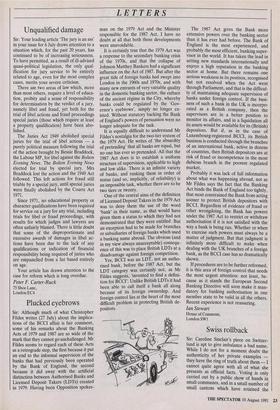Plucked eyebrows
Sir: Although much of what Christopher Fildes writes (27 July) about the implica- tions of the BCCI affair is fair comment, some of his remarks about the Banking Acts of 1979 and 1987 are so wide of the mark that they cannot go unchallenged. Mr Fildes seems to regard each of these Acts as a retrograde step, the first because it put an end to the informal supervision of the banks that had previously been operated by the Bank of England, the second because it did away with the artificial distinction between Authorised Banks and Licensed Deposit Takers (LDTs) created in 1979. Having been Opposition spokes- man on the 1979 Act and the Minister responsible for the 1987 Act, I have no doubt at all that both these developments were unavoidable.
It is certainly true that the 1979 Act was a response to the secondary banking crisis of the 1970s, and that the collapse of Johnson Matthey Bankers had a significant influence on the Act of 1987. But after the great tide of foreign banks had swept into London in the 1960s and 1970s, and with many new entrants of very variable quality in the domestic banking sector, the culture of the ancient regime in the City, whereby banks could be regulated by the `Gov- ernor's eyebrows', simply no longer ex- isted. Without statutory backing the Bank of England's powers of persuasion were no longer adequate for the task. It is equally difficult to understand Mr Fildes's nostalgia for the two-tier system of the 1979 Act. He writes of 'the absurdity of pretending' that all banks are equal, but no one has ever so pretended. All that the 1987 Act does is to establish a uniform structure of supervision, applicable to high and low alike. There is an infinite variety of banks, and ranking them in order of status (and so, implicitly, of reliability) is an impossible task, whether there are to be two tiers or twenty. One of the central aims of the definition of Licensed Deposit Takers in the 1979 Act was to deny them the use of the word `bank' in their name, as that would have given them a status to which they had not demonstrated that they were entitled. But an exception had to be made for branches or subsidiaries of foreign banks which used a banking name abroad. The obvious (and in my view always unacceptable) consequ- ence of this was to place British LDTs at a disadvantage against foreign competition. Yes, BCCI was an LDT, not an autho- rised bank, before the 1987 Act, but the LDT category was certainly not, as Mr Fildes suggests, 'invented to find a defini- tion for BCCI'. Unlike British LDTs it had been able to call itself a bank all along because of its foreign ownership. And foreign control lies at the heart of the most difficult problem in protecting British de- positors. The 1987 Act gives the Bank more extensive powers over the banking sector than it has ever had before. The Bank of England is the most experienced, and probably the most efficient, banking super- visor in the world. It has taken the lead in setting new standards internationally and enjoys a high reputation in the banking sector at home. But there remains one serious weakness in its position, recognised but not resolved when the Act went through Parliament, and that is the difficul- ty of maintaining adequate supervision of banks under foreign control. If the busi- ness of such a bank in the UK is incorpo- rated as a British company, then the supervisors are in a better position to monitor its affairs, and in a liquidation all its assets would be available for its (British) depositors. But if, as in the case of Luxembourg-registered BCCI, its British business is conducted through the branches of an international bank, active in dozens of countries, then British depositors are at risk of fraud or incompetence in the most dubious branch in the poorest regulated market.
Probably it was lack of full information about what was happening abroad, not as Mr Fildes says the fact that the Banking Act binds the Bank of England too tightly, that most constrained the Bank from acting sooner to protect British depositors with BCCI. Regardless of evidence of fraud or other wrongdoing, the Bank has powers under the 1987 Act to restrict or withdraw authorisation if it is not satisfied with the way a bank is being run. Whether or when to exercise such powers must always be a matter of judgment. But that judgment is infinitely more difficult to make when dealing with the UK branches of a foreign bank, as the BCCI case has so dramatically shown.
If procedures are to be further reformed, it is this area of foreign control that needs the most urgent attention: not least, be- cause as it stands the European Second Banking Directive will soon make it man- datory for banking authorisation in one member state to be valid in all the others. Recent experience is not reassuring.
Ian Stewart
House of Commons,
London SW1


















































 Previous page
Previous page